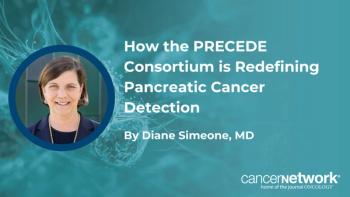
Treatment with PARP Inhibitors Increased Risk of Myelodysplastic Syndrome and Acute Myeloid Leukemia
A study published in The Lancet Hematology found an increased risk of developing myelodysplastic syndrome and acute myeloid leukemia when patients with cancer were treated with PARP inhibitors compared with placebo.
Patients treated with PARP inhibitors saw an increased risk of myelodysplastic syndrome and acute myeloid leukemia (AML) versus patients treated with placebo, according to data published in The Lancet Hematology.
To improve clinical understanding in the front-line maintenance setting, future research is necessary to evaluate the delayed adverse event profile found in this trial.
“Aside from improving progression-free survival, and, as recently observed, overall survival, PARP inhibitors increased the risk of myelodysplastic syndrome and acute myeloid leukaemia versus placebo in our safety meta-analysis,” wrote the investigators. “Myelodysplastic syndrome and acute myeloid leukaemia cases related to PARP inhibitor therapy appear to be rare and delayed adverse events, associated with a substantial proportion of deaths.”
The research team found 31 eligible randomized controlled trials and analyzed 28 of those, for a total of 5693 patients in PARP inhibitor groups and 3406 patients in control groups, to determine their adverse events profile.
When analyzing the 18 trials with randomization that included a placebo arm, the investigators found that PARP inhibitors significantly increased the risk of myelodysplastic syndrome and AML versus treatment with placebo (Peto OR, 2.63; 95% CI, 1.13-6.14]; P = .026).
Incidence rate for myelodysplastic syndrome and AML was reported at 0.73% (95% CI, 0.50-1.07; 21 events out of 4533 patients) for the PARP inhibitor groups and 0.47% (95% CI, 0.26-0.85; 3 events out of 2774 patients) for the placebo groups.
More, an analysis of WHO’s pharmacovigilance database (VigiBase) found 178 cases of myelodysplastic syndrome (n = 99) and AML (n = 79) that were related to treatment with PARP inhibitors.
“Our meta-analysis showed that occurrence of myelodysplastic syndrome and acute myeloid leukaemia in patients with cancer was related to PARP inhibitor regimens across 28 [ randomized controlled trials],” wrote the investigators. “Furthermore, clinical features recorded in WHO’s real-world pharmacovigilance database highlighted that myelodysplastic syndrome and acute myeloid leukaemia occurred several months after PARP inhibitor administration, with a high frequency of death and co-reported cytopenia in confirmed cases.”
Median treatment duration was reported to be 9.8 months (interquartile range [IQR], 3.6-17.4; n = 96), with a median latency period since first exposure to PARP inhibitors of 17.8 months (IQR, 8.4-29.2; n = 58) according to available data. A total of 47 deaths (45%) out of the 104 available cases were reported.
Research included randomized controlled trials that compared treatment with PARP inhibitors versus placebo for adult patients collected from MEDLINE, the Cochrane Central Register of Controlled Trials, and the ClinicalTrials.gov registry. The primary analysis focused on the risk of myelodysplastic syndrome and AML as it relates to treatment with PARP inhibitors versus placebo.
“Further research and individual patient data are needed to improve understanding and define patient-specific risk factors and susceptibility to these adverse events, particularly in the front-line maintenance setting,” wrote the investigators. “Clinicians need to remain vigilant in evaluating delayed haematological toxicities in patients treated with PARP inhibitors.”
Reference:
Morice PM, Leary A, Dolladille C, et al. Myelodysplastic syndrome and acute myeloid leukaemia in patients treated with PARP inhibitors: a safety meta-analysis of randomised controlled trials and a retrospective study of the WHO pharmacovigilance database. Lancet Haematol. 2021;8(2):e122-e134. doi: 10.1016/S2352-3026(20)30360-4
Newsletter
Stay up to date on recent advances in the multidisciplinary approach to cancer.





































